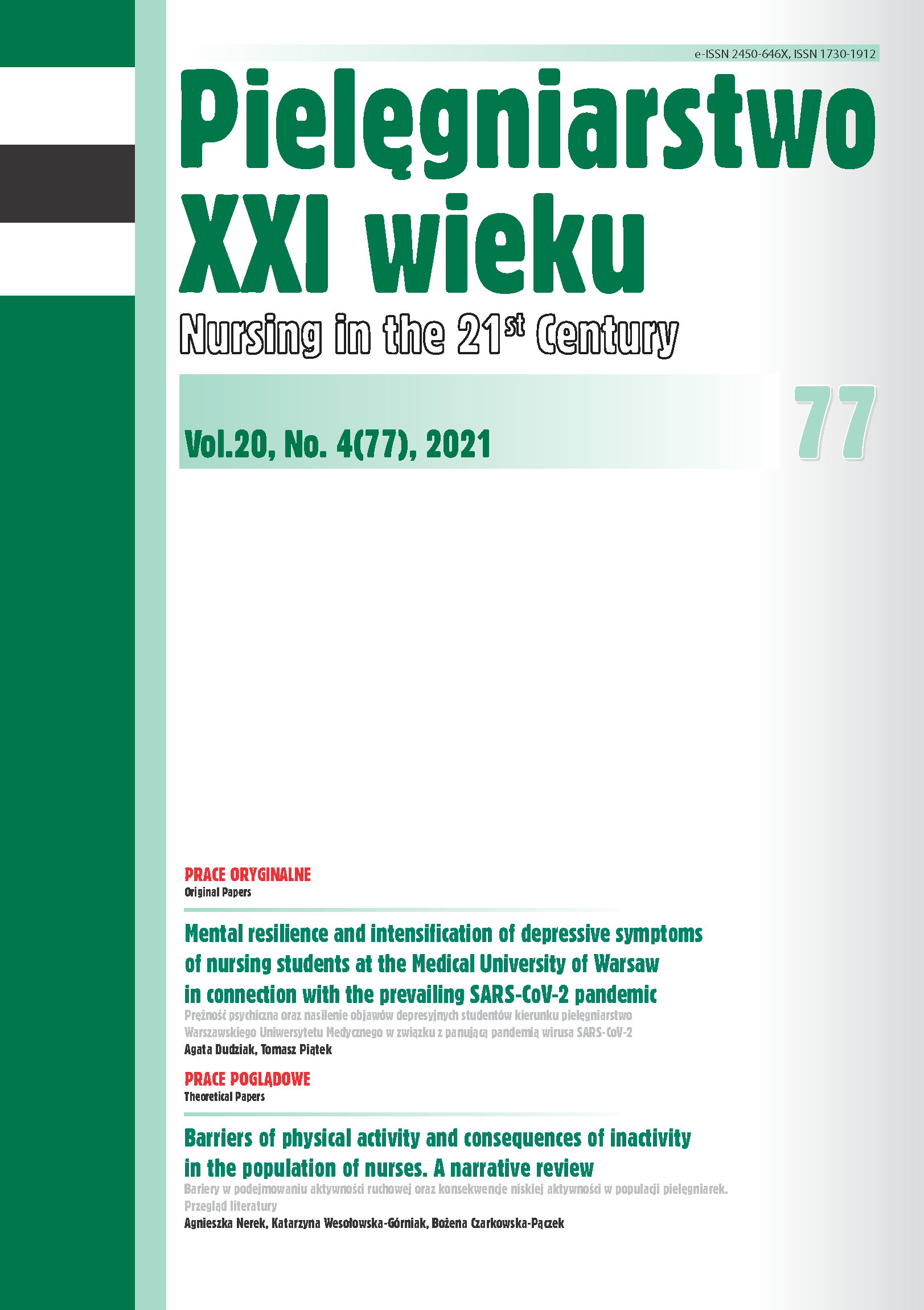Mental resilience and intensification of depressive symptoms of nursing students at the Medical University of Warsaw in connection with the prevailing SARS-CoV-2 pandemic
DOI:
https://doi.org/10.2478/pielxxiw-2021-0034Keywords:
SARS-CoV-2, COVID-19, psychological resilience, pandemic, student, depressionAbstract
MENTAL RESILIENCE AND INTENSIFICATION Of DEPRESSIVE SYMPTOMS Of NURSING STUDENTS AT THE MEDICAL UNIVERSITY Of WARSAW IN CONNECTION WITH THE PREVAILING SARS-COV-2 PANDEMIC
Aim. The aim of the study was to assess the state of mental resilience and intensification of depressive symptoms in group of students of nursing at the Medical University of Warsaw during the SARS-CoV-2 pandemic.
Material and methods. The study involved 130 students of nursing at the Medical University of Warsaw. The age of the group were for 19 to 49, the average age was 24.3 years. The validated questionnaires SPP-25 and PHQ-9 were used to assess the mental state and the level of resilience of students.
Results. 44,6% (n=58) of respondents consider that the pandemic definitely influenced the perception of oneself, and 55,7% (n=75) of students a significant decrease in motivation to act was observed. In 53,1% (n=69) of cases the pandemic had a significant impact on their relationships with other people. Almost three-quarters of respondents noted an essential impact of the pandemic on their daily life.
Conclusions. The level of resilience is negatively related to various aspects of life, the higher the level is the smaller changes were observed in various areas of life. The people who suffered from COVID-19 are characterized by higher level of depression and lower level of resilience.
References
1. Raport zakażeń koronawirusem (SARS-CoV-2) – Koronawirus: informacje i zalecenia – Portal Gov.pl. https://www.gov.pl/web/koronawirus/wykaz-zarazenkoronawirusem-sars-cov-2 (accessed Apr. 22, 2021).
2. Barzilay R, et al. Resilience, COVID-19-related stress, anxiety and depression during the pandemic in a large population enriched for healthcare providers. Transl. Psychiatry.2020; 1(10): 1-8. doi: 10.1038/s41398-020-00982-4.
3. Li ZS, Hasson F. Resilience, stress, and psychological well-being in nursing students: A systematic review. Nurse Education Today. 2020; 1(90). doi: 10.1016/j. nedt.2020.104440.
4. Pappa S, Ntella V, Giannakas T, et al. Prevalence of depression, anxiety, and insomnia among healthcare workers during the COVID-19 pandemic: A systematic review and meta-analysis. Brain, Behavior, and Immunity. 2020; 1(88): 901-907. doi: 10.1016/j. bbi.2020.05.026.
5. Labrague LJ, De los Santos JAA. COVID-19 anxiety among front-line nurses: Predictive role of organisational support, personal resilience and social support. J. Nurs. Manag. 2020; 7(28): 1653-1661. doi: 10.1111/jonm.13121.
6. Amsrud KE, Lyberg A, Severinsson E. Development of resilience in nursing students: A systematic qualitative review and thematic synthesis. Nurse Education in Practice. 2019; 1(41): 102621. doi: 10.1016/j.nepr.2019.102621.
7. Savitsky B, Findling Y, Ereli A, et al. Anxiety and coping strategies among nursing students during the covid-19 pandemic. Nurse Educ. Pract. 2020; 46. doi: 10.1016/j. nepr.2020.102809.
8. Roy D, Tripathy S, Kar SK, et al. Study of knowledge, attitude, anxiety & perceived mental healthcare need in Indian population during COVID-19 pandemic. Asian J. Psychiatr. 2020; 51: 102083. doi: 10.1016/j.ajp.2020.102083.
9. Salari N, et al. Prevalence of stress, anxiety, depression among the general population during the COVID-19 pandemic: A systematic review and meta-analysis. Globalization and Health. 2020; 1(16): 57. doi: 10.1186/s12992-020-00589-w.
10. Gallego-Gómez JI, et al. The COVID-19 pandemic and its impact on homebound nursing students. Int. J. Environ. Res. Public Health. 2020; 20(17):1-10. doi: 10.3390/ ijerph17207383
11. Rudd KE, et al. Global, regional, and national sepsis incidence and mortality, 1990– 2017: analysis for the Global Burden of Disease Study. Lancet. 2020; 10219(395): 200211. doi: 10.1016/S0140-6736(19)32989-7.
12. Thomas LJ, Revell SH. Resilience in nursing students: An integrative review. Nurse Education Today. 2016; 1(36): 457-462. doi: 10.1016/j.nedt.2015.10.016.
Downloads
Published
Issue
Section
License
Copyright (c) 2021 Authors

This work is licensed under a Creative Commons Attribution-NonCommercial-NoDerivatives 4.0 International License.




